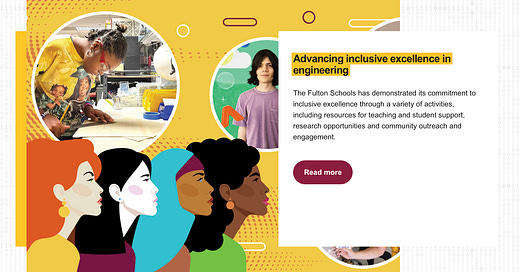You might think DEI nonsense is limited to the Humanities porgrams at ASU and that you can protect yourrself or your children from it by having them go into an objective and merit based program like engineering. ASU’s Ira P. Fulton School of Engineering wants you to know you’re wrong about that. They are deeply invested in DEI and don’t plan to change.
Arizona State University’s School of Engineering claims to be committed to “inclusive excellence.” That phrase sounds promising—after all, who would be against education that is accessible to all and fosters genuine excellence? But as we dig deeper into their actual policies, we find something very different: a commitment not to equal opportunity, but to a redistribution of resources based on racial and sexual identity categories. It is identity politics in engineering.
In this video, I examined ASU’s engineering program webpage, where “inclusive excellence” is initially framed as broad accessibility in education—a noble goal. But as we scroll further, we find that ASU has redefined “excellence” to mean an active restructuring of the program to favor some identity groups over others. And how does ASU determine who is most deserving? Not by considering individual character, effort, or life experience, but by using the bluntest possible metric: race, cultural background, and sexual preference. It is identity politics.
It’s an old playbook without yet changing rhetoric to hide (that’s coming as soon as they want federal money). The university does not examine the real challenges or obstacles students may have faced in life—poverty, personal hardship, or even educational background. Instead, it divides people into categories based on the color of their skin and their identity markers, distributing resources accordingly. This isn’t justice, and it certainly isn’t excellence. It’s racial determinism masquerading as progress.
It relies on an appeal to pity to help the less fortunate but it has not pity on those who are judged and held back for being in the wrong identity group.
What Happened to Merit?
Historically, engineering has been one of the most meritocratic fields—if you can solve the problem, you can do the job. That’s why some of the greatest advancements in engineering have come from individuals across all backgrounds, united not by their skin color but by their ability and effort. ASU, however, seems to think that engineering needs to be “rebalanced” according to its own ideological framework.
By prioritizing identity over merit, the school sends a clear message: skill and excellence are secondary to political alignment. In the long run, this damages not only students who work hard and expect a fair system, but also the profession itself. Engineering is not a field where ideology can override reality. If you build a flawed structure, it will collapse—no matter how “inclusive” the process of its construction was.
Diversity is not our strength. E Pluribus Unum is our strength. Out of many, diversity, one.
A Test for ASU’s DEI Commitment
Here’s a challenge for ASU’s School of Engineering: If they are truly committed to “inclusive excellence,” let’s see them remove identity politics from their policies altogether. Let’s see them offer scholarships based on demonstrated need and merit rather than race or sexual identity. Let’s see them commit to producing the best engineers—period—rather than the most demographically aligned ones.
Of course, that won’t happen. Because the real goal of DEI is not inclusion, but exclusion—exclusion of those who do not fit the ideological mold.
The Future of Engineering: A Choice Between Ideology and Excellence
The future of engineering at ASU, and across the country, is at a crossroads. Will the field continue to be defined by objective excellence and real-world results, or will it be reshaped into a social experiment where success is measured by adherence to DEI mandates rather than the quality of one’s work?
ASU’s School of Engineering has made its choice. The question is whether students and employers will accept it. Because in the real world, when a bridge fails, when a medical device malfunctions, or when an electrical grid collapses, no one will care whether the team that built it was “diverse” enough. They will only care whether it worked.





Considering what came up in a discussion about ethics in the realm of software engineering, I shouldn’t be surprised.
The specific prompt was something about an AI being used for screening job applicants that was disproportionately selecting male over female applicants.
Gotta love the question begging going on with such a prompt, namely that the only reason males were being selected is the sole fact that they’re male.